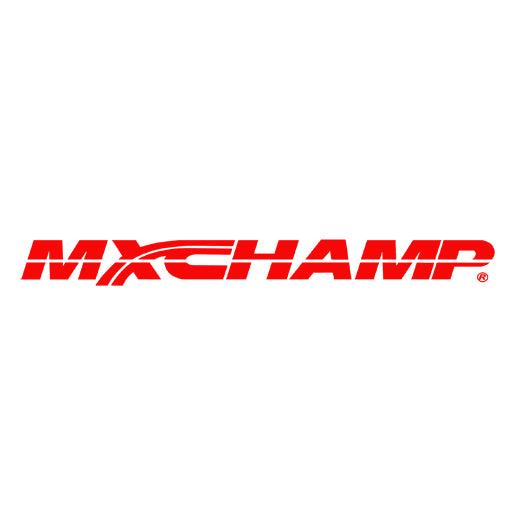- Regular price
- $779.95
- Regular price
-
$829.95 - Sale price
- $779.95
- Unit price
- per
Couldn't load pickup availability
- MXCHAMP dirt bike wheels were built for enthusiasts and weekend warriors looking for a good value for their money
- Perfect for OEM Replacement wheels and other economical wheels
-
MXCHAMP A90 dirt bike wheels are laced up strongest and lightest dirt bike rims, forged motorcycle wheel hub & dirt bike spokes as well as professional mechanic with digital wheel balancer. These motocross wheels balancing reached out Japanese wheel balancing standard JIS D4215
Rims
-
Rim made by aircraft-quality aluminum 7050 materials, three-stage heat treatment T7351 for highest tensile strength(550-560 Mpa), original from KTM OEM’s motocross rims source and DOT approved, tested by top pro riders and teams in USA
-
More lighter(21”x1.6”-36H front black dirt bike rims 1.449kgs/3.18lbs , rear black dirt bike rims 19”X2.15”-36H 1.95kgs/4.29lbs and 18”X2.15”-36H 1.8kgs/4.059lbs ) than OEM stock excel rims, did rims and other competitor’s rims.
Hubs
-
MXCHAMP Hubs made from aircraft quality heat forged 6061-T6 aluminum core completely hub inside, and employ tight tolerances to ensure perfect concentric
-
Drilling angles in the hub by most advanced 5-axle CNC machine and rim are perfectly matched the spoke bend angels for a stronger more efficient wheel
-
Hubs run oversize Japanese NSK bearings. rear hubs have 3 bearings instead of 2 thin bearings like some OEM stock hubs
-
Seals are double working seals.
-
Complete with spacers ready to fit as a direct aftermarket replacement wheel
Spokes & Nipples
-
Stainless steel spokes made of ultra stronger stainless steel (T302H), Up to 20% stronger(average tensile strength >16,000 N.m, average deflection<11mm)than other competitor’s spokes and OEM stock spokes
-
Our spoke are heat forged and utilize a higher precision thread, anti-seize treatment to keep the nipple from back out of the nipple due to vibration
-
Black stainless steel spokes use a special LEC (liquid electrostatic coating), that is extremely durable and lightweight.
-
Nipple made of aluminum(7075-T7351) and all color anodized is available(red, blue, gold, black, orange, lake blue, green, grey and silver
-
Our aluminum nipple utilize a square body allows the nipple to be turn by contact the entire nipple
-
Aluminum Spoke wrench (with 6.5mm head)rubber strip included
-
Other Facts
-
Complete wheel more lighter (Front wheel: around 3.365kgs/7.418lbs, Rear wheel: around 4.39kgs/9.678lbs)than other competitor’s wheels
-
Customized colors wheel order is acceptable, just specify rims(black, red,orange, purple, green, blue and gold), hubs(black, red,orange,lake blue, purple, green, blue, brown and gold), spokes(black, silver)nipples(silver,black, red,orange,lake blue, purple, green, blue and gold)color when placing order. Go to our link Build your Dream Wheels to see your wheel looks like
- The buyer must specify your bike make/model/year and and vehicle identification number(VIN). Check the Compatible Bikes BEFORE placing order. If your bike not listed on the compatible bikes list . Please send us your inquiry to: sales@mxchampusawheels.com
- International Buyers please understand you are responsible for all duties, taxes and customs fees associated with the purchase. These fees are not included in the price of the item, Also the US customs may requests the buyer to submit the HS-7 form to clear US customs if your order was shipped from overseas. We recommend you contact your customs office to find out what those fees and form may be before you purchase.
Important Announcement: MXCHAMP is Road Dreams Industries Ltd. registered trademark in USA. All rights reserved. We NEVER authorized any other dealer to sell MXCHAMP trademark products in USA. The customer must be aware of any counterfeit “MXChamp" wheels (etched "MXCHAMP" trademark on the rim and hub)on the other fraud website
-
California Proposition 65
WARNING: This product contains chemicals known to the State of California to cause cancer, and birth defects or other reproductive harm. Wash hands after handling. For more information, go to www.p65Warnings.ca.gov
10 Things You Need to Know About the Dirt Bike Wheels
1.Dirt Bike Rims
It doesn't matter whether the spokes are tightened up correctly or not, The dirt dike rims do bend. There is no alternative for a quality wheel rim. The distinction in between a good quality rim can be just as a flat spot or as much as a broken rim. Bad quality motocross rims generally crack at the weld.
2.Dirt Bike Hubs
OEM stock hubs versus aftermarket-who takes the cake? At the hi-end of the sport, most of pro racers utilize either works or aftermarket hubs, most of which are billet. Forged hubs are solid and reliable, however have a tendency to be a little heavier than casting hubs. Casting allows the designer (or maker) to choose the proper measurement without needing to trim the design out of a solid chunk of metal. On a side note, the question of "declining" (cutting product off the hub) the stock hubs to looks like the factory appearance typically shows up. We do not recommend this.
3.Bearings and Seals
Bearings are an often-overlooked aspect of race performance. Used, galled or grabbed bearings reduce wheel spin, boost drag and sway at speed. Replacing wheel bearings at regular intervals (at least once a year) is an inexpensive service that pays dividends.
4.Suspension
The method you set up your suspension can effect the lifespan of your wheels. Stock wheels are built to rigorous standards- with the understanding that casing leaps, flat touchdown or plowing into a downed bike can exceed the limits of light weight aluminum rims, carbon steel stock spokes and casting hubs. Properly set-up suspension can increase the life expectancy of your wheels.
5. Wheel Rim Locks
Some riders commonly ask the number of rim locks to make use of. Rim locks quit the tire from rotating on the rim. Front wheels just require one rim lock. For back wheels, the number can vary depending upon horse power, riding circumstance and air-pressure choose. Big engine bikes (450cc or up) can warrant two rim locks because of the number of wheel spin and torque. Running low air pressure would be an additional reason for 2 rim locks. If your rim just has one hole, you should pierce a 2nd hole; nevertheless, we suggest you calling a good motorcycle wheel-service store for this treatment.
6. Dirt Bike Spokes and Nipples
Typically, OEM stock spokes and nipple are not bad quality; however, KTM, Husqvarna & GasGas had quality issues with their front and rear spokes. Changing spokes can run anywhere from $50 to $200 per wheel. Similar to any type of dirt bike parts, spokes wear out. They extend over time, break in crashes and suffer from absence of tightening or over-tightening. If you do not examine your spokes at fixed period, like before every race, you endanger the structural integrity of the wheel itself. If you over-tighten the spokes, you can stress them enough to break. The exact same is true for nipples. We have seen racers round off their nipples by trying to tighten up spokes that have actually stretched far reason. We have actually seen racer whose nipples are so loosened that they have vanished down into the rim. We have seen nipple that are so grab on the spoke that the only method to disassemble the wheel is to cut the spokes off.
Maximize your wheelset strength and ensure that all spoke nipples are torqued to the proper specs. Refer to your owner’s manual for each model’s proper spoke torque setting. Overtightened nipples/spokes can generate a weak wheel set and you’ll be more likely to break spokes or bend a wheel rims.
7. Too Much Maintenance
Think about your spokes as the strings on a guitar. The strings can be strummed to play a melodious tune when they are tensioned appropriately. A loose string on a guitar provides a false note. Many racer assume that inspecting their spokes means tightening them. Not true. Examining them means analyzing their state of melody. The highest cause of broken spokes and also eventually broken wheels is riders who turn each spoke a little each time they ride. Doing this melodies every spokes to an "F-sharp" generates the risk of having the threaded end of the spoke poke through the nipple into the internal tube.
8.Torque Spoke Wrench
This is one of key tools that every racer should to ready. A spoke torque wrench is the most effective means to ensure the spokes are serviced correctly and set to the right torque specs. For OEM stock wheels, refer to the owner's manual for these torque specs. Unusually, we recommend you set up the torque spoke wrench 3.5-4.0N.m(35-40 lbs.inch) and turn around each nipple till you heard "click" sound.
9.Preserve
If you choose to run aftermarket billet hubs, there are a few points to note. These hubs are usually made from aluminum billet and than anodized. The back hub can get really hot from thermal disbursed from the back brake. When cleaning your bike after riding, it is right way only use water till whole bike cools. The chemicals in cleansers will certainly stain or streak the hubs when they are hot. Stock hubs will typically get tarnished despite what you do, particularly the back, as things like chain lube will certainly get onto the hub when it's hot. Likewise, when you wash your bike, stay away of spraying straight into the location of the wheel bearings. For a deep cleaning, take the wheels off the bike and also use compressed air to clear up any kind of wetness in the area of the bearings.
10. Factory Stock Hubs
Factory racing teams can use up to 10 sets of hubs per racer per season. Relying on the variety of hrs they were ridden and the circumstances that the hubs were made use of in, the used hubs might be transferred to the racer's practice bikes the next year. Most of racing teams utilize new hubs every season for safety reason.
Size Chart
Related Products
- Regular price
- $779.95
- Regular price
-
$829.95 - Sale price
- $779.95
- Unit price
- per
- Regular price
- $779.95
- Regular price
-
$829.95 - Sale price
- $779.95
- Unit price
- per
- Regular price
- $779.95
- Regular price
-
$829.95 - Sale price
- $779.95
- Unit price
- per
- Regular price
- $779.95
- Regular price
-
$829.95 - Sale price
- $779.95
- Unit price
- per
- Regular price
- $779.95
- Regular price
-
$829.95 - Sale price
- $779.95
- Unit price
- per
- Regular price
- $779.95
- Regular price
-
$829.95 - Sale price
- $779.95
- Unit price
- per
- Regular price
- $779.95
- Regular price
-
$829.95 - Sale price
- $779.95
- Unit price
- per
- Regular price
- $779.95
- Regular price
-
$829.95 - Sale price
- $779.95
- Unit price
- per
- Regular price
- $779.95
- Regular price
-
$829.95 - Sale price
- $779.95
- Unit price
- per
- Regular price
- $779.95
- Regular price
-
$829.95 - Sale price
- $779.95
- Unit price
- per




































